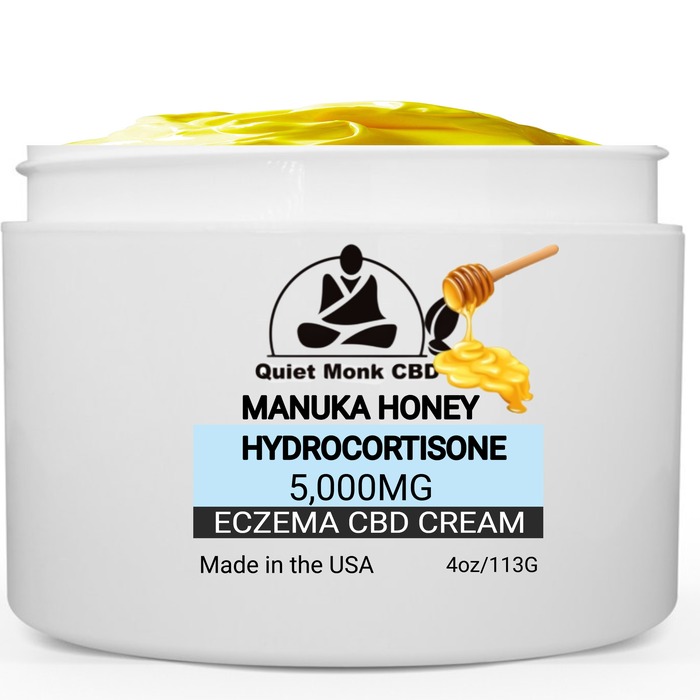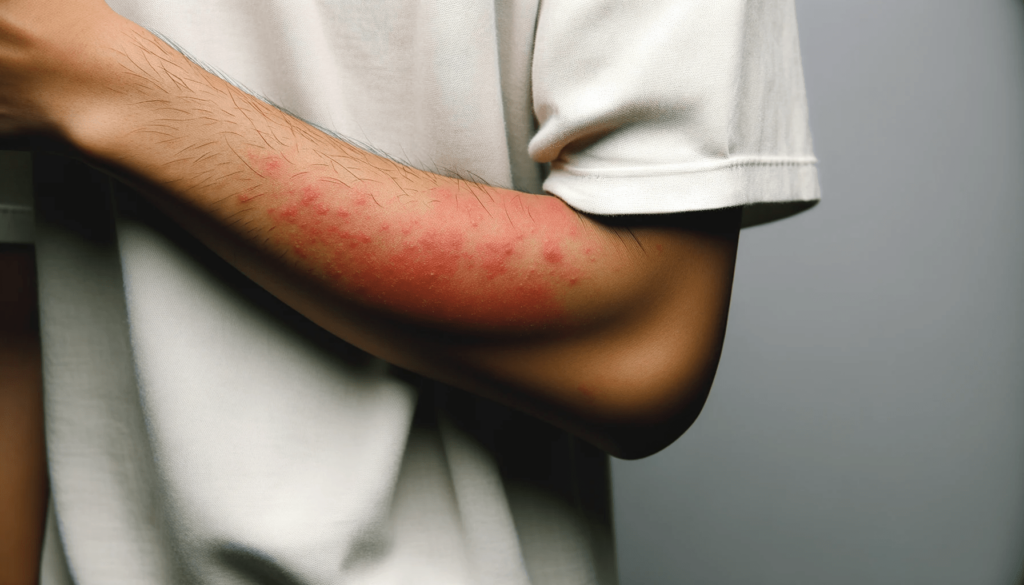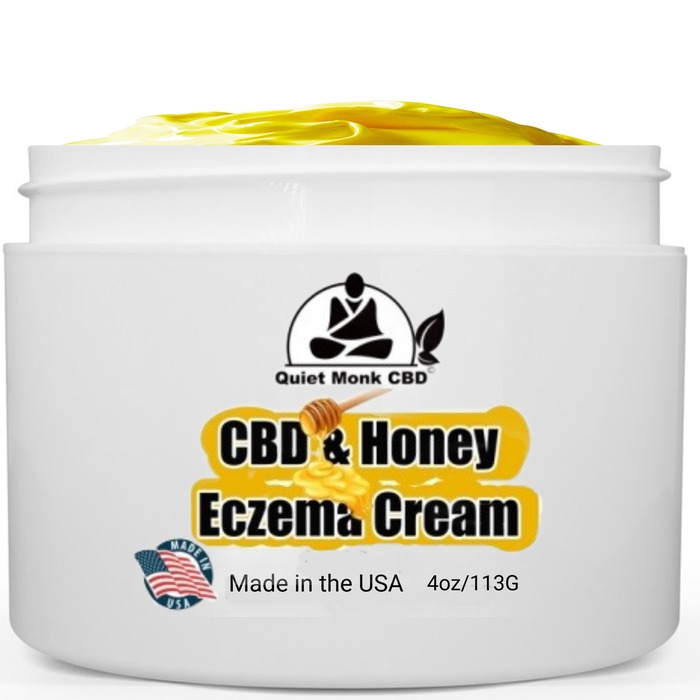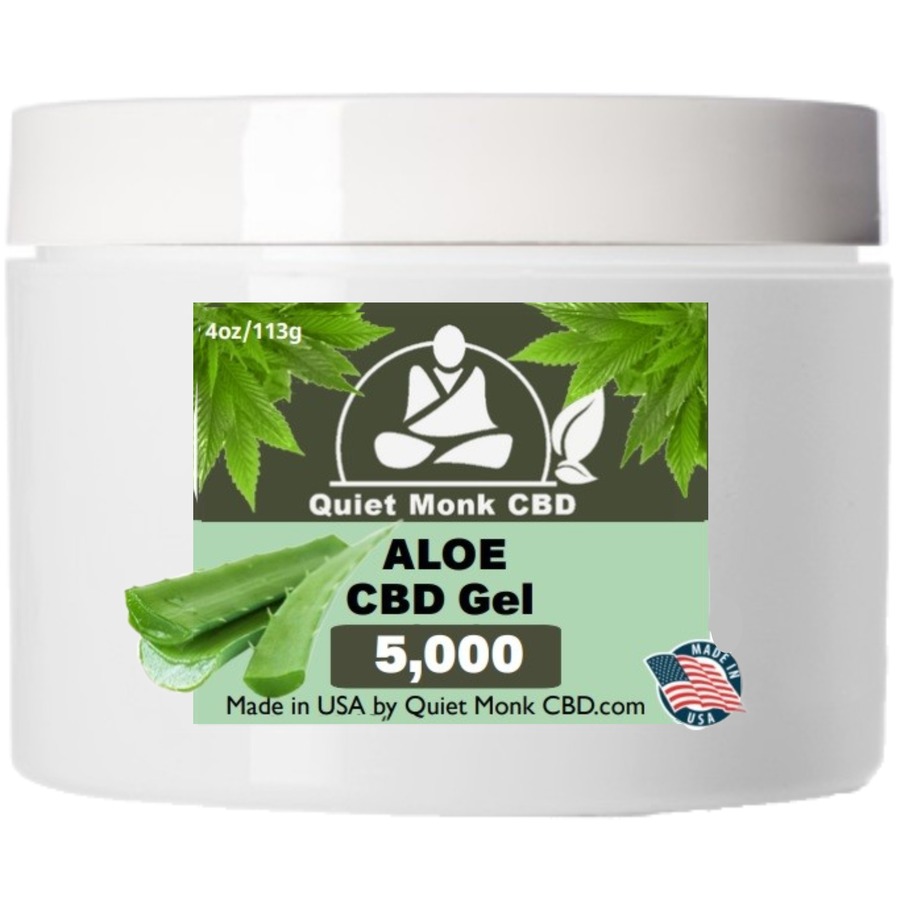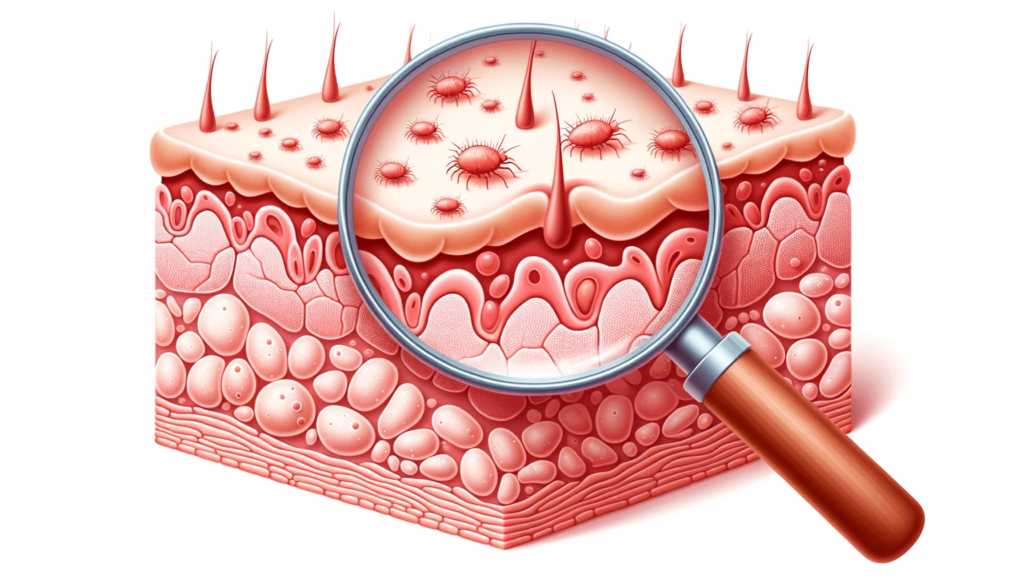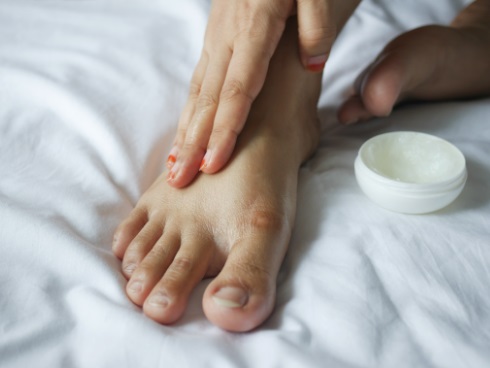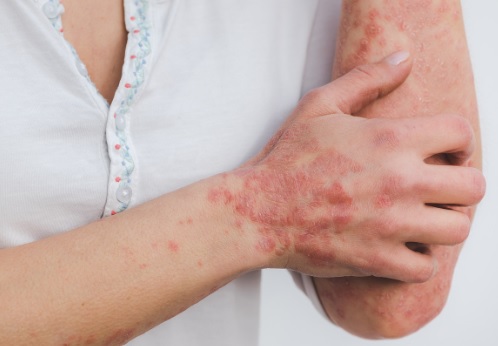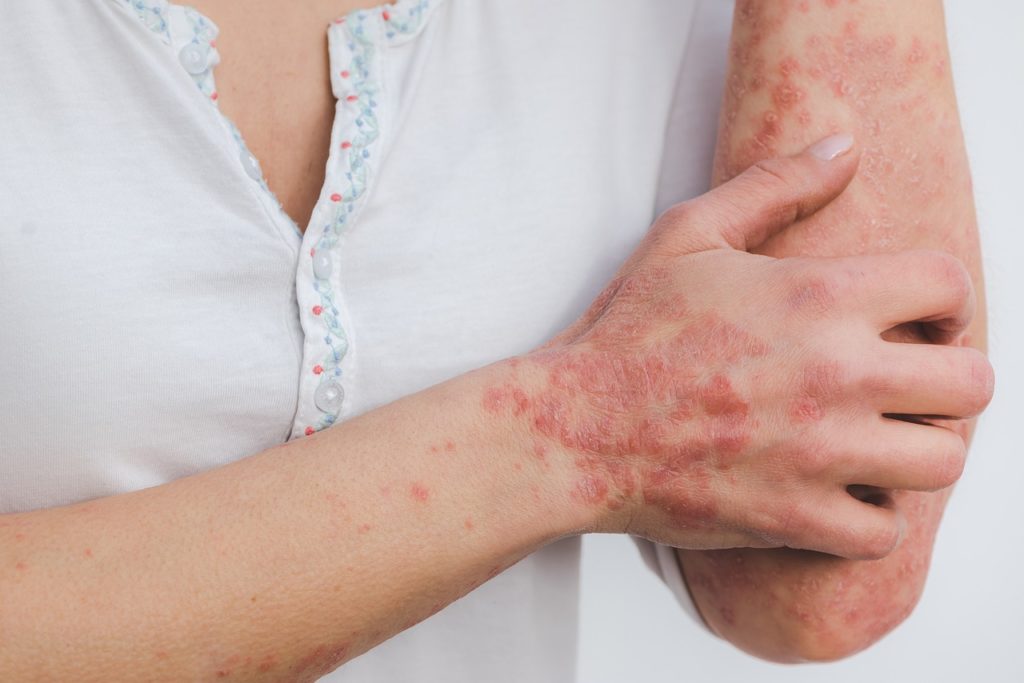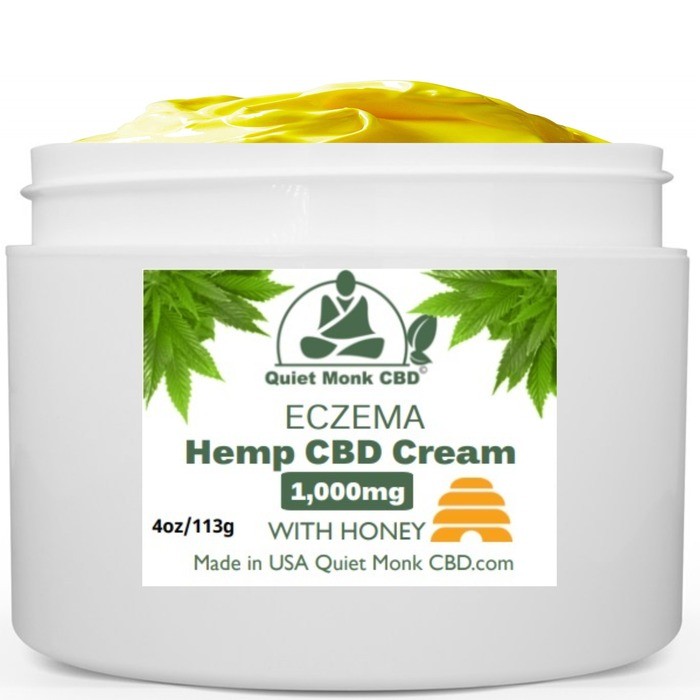Eczema, also known as atopic dermatitis, is a chronic skin condition characterized by dry, itchy, and inflamed skin. It is estimated that around 31.6 million Americans have eczema, making it a common skin issue. Although there is no cure for eczema, there are various treatment options available to manage symptoms and improve the quality of life for those affected.

Eczema can develop at any age, although it is most commonly seen in children. The exact cause of eczema is still unknown, but it is believed to be a combination of genetic and environmental factors.
The symptoms of eczema can vary but commonly include red, dry, and itchy skin, rashes, and rough or scaly patches. These symptoms can be triggered by various factors, such as stress, irritants, allergens, and changes in temperature or humidity.
There are various treatment options available for eczema, including topical and oral medications, light therapy, and natural remedies. Recently, Eczema CBD cream has gained attention as a potential treatment for eczema due to its anti-inflammatory and moisturizing properties.
CBD cream is a topical product that contains cannabidiol (CBD) as the main active ingredient. CBD is a compound derived from the cannabis plant, but unlike tetrahydrocannabinol (THC), it does not produce psychoactive effects. It is believed that CBD can interact with the body’s endocannabinoid system to reduce inflammation and promote overall skin health.
Some potential benefits of using CBD cream for eczema include relieving itching and inflammation, reducing dryness and scaling, and improving the skin’s barrier function. However, more research is needed to fully understand the effectiveness of CBD for eczema.
While CBD is generally well-tolerated, some people may experience side effects such as dry mouth, diarrhea, or changes in appetite. It is always advisable to consult with a doctor before using CBD for any medical condition.
When using CBD eczema treatment cream, it is essential to follow the recommended dosage and application instructions. It is also important to do a patch test first to check for any potential allergic reactions and to consult with a healthcare professional if you are taking any other medications.
In conclusion, CBD cream may offer potential benefits for managing symptoms of eczema. However, further research is needed to fully understand its effectiveness and safety for this condition. It is always advisable to consult with a doctor and try multiple treatment options for eczema to find the best approach for your individual needs.

Key Takeaways:
CBD cream can be a potential natural remedy for treating eczema. CBD cream works by interacting with the body’s endocannabinoid system to reduce inflammation and relieve symptoms of eczema. When choosing a CBD cream for eczema, look for high-quality, organic ingredients and consult with a healthcare professional before use.
What is Eczema?
What is Eczema?
Eczema is a chronic skin condition that causes inflammation, itching, and redness. It often appears as dry, scaly patches on the skin. Eczema can be triggered by various factors such as allergies, stress, and irritants. It is not contagious and can vary in severity from person to person.
To manage symptoms, treatment for eczema involves:
- Moisturizing the skin
- Avoiding triggers
- Using prescribed medications
Pro-tip: To prevent flare-ups, remember to keep your skin moisturized, avoid harsh soaps, and opt for loose-fitting clothing made of natural fibers.
How Does Eczema Develop?
Eczema is a condition that results from a combination of genetic and environmental factors. By understanding the process, individuals can effectively manage and prevent flare-ups.
- Genetic predisposition: Certain genes can make individuals more susceptible to developing eczema.
- Immune system dysfunction: People with eczema have an overactive immune response to irritants, which leads to inflammation and skin damage.
- Barrier dysfunction: Eczema disrupts the natural protective barrier of the skin, making it easier for irritants, allergens, and bacteria to penetrate.
- Trigger factors: Flare-ups can be triggered by allergens, irritants, stress, weather changes, and certain foods.
Here’s a true story: Sarah developed eczema as a child due to a family history of the condition. She successfully managed her eczema by avoiding triggers, using moisturizers, and incorporating a CBD cream into her skincare routine. The CBD cream effectively reduced inflammation and itching, providing relief during flare-ups. With a combination of self-care and medical treatment, Sarah was able to comfortably manage her eczema and live a fulfilling life.
What are the Symptoms of Eczema?
Eczema is a chronic skin condition that presents with symptoms such as redness, itching, dryness, and inflammation.[1] The most prevalent symptom is intense itching, which can lead to scratching, skin damage, and infection.[2] Other symptoms include patches of dry, scaly skin, skin thickening, and small, raised bumps.[3] Symptoms of eczema can vary from person to person and may worsen during flare-ups or in response to certain triggers such as dry air, irritants, or allergens.[4] Identifying and managing these symptoms is crucial for effectively treating and controlling eczema.
What Causes Eczema?
Eczema, a common skin condition, has various potential causes. These include allergies, genetics, immune system dysfunction, and environmental factors. Flare-ups can be triggered by allergens such as pollen or pet dander. Genetic factors can also make individuals more prone to developing eczema. A weakened immune system may not be able to effectively protect the skin. Additionally, environmental factors like harsh soaps or extreme weather conditions can exacerbate symptoms.
To effectively manage eczema, it is important to identify and avoid triggers, regularly moisturize, use mild soaps, and wear gentle fabrics. Seeking advice from a dermatologist can provide personalized recommendations for managing eczema.
Is Eczema Genetic?
Is Eczema Genetic? The development of eczema can have a genetic component, as certain genes have been associated with an increased risk of the condition. However, it is not a guarantee that someone will develop eczema even if they have these genes. Other factors, such as environmental triggers and immune system dysfunction, also play a significant role.
Researchers have identified several genes related to eczema, specifically those involved in skin barrier function and immune response. Understanding the genetic basis of eczema can aid in the development of personalized treatments and interventions for individuals at risk. It’s important to note that genetic predisposition is just one factor and that other elements can contribute to the development of eczema.
Are There Environmental Triggers for Eczema?
Environmental factors can greatly impact the development and worsening of eczema symptoms. These triggers can include:
- Weather conditions: Drastic temperatures, humidity, and dryness can all contribute to flare-ups.
- Allergens: Exposure to common allergens like pollen, dust mites, pet dander, and mold can exacerbate symptoms.
- Irritants: Coming into contact with irritants such as harsh soaps, detergents, and certain fabrics can cause eczema to worsen.
- Chemicals: Exposure to certain chemicals, such as fragrances, preservatives, and solvents, can also trigger symptoms.
- Stress: Emotional stress and excessive sweating can act as additional triggers.
Fact: Interestingly, about 30% of individuals with eczema also have food allergies, which can serve as environmental triggers for the condition.
How is Eczema Diagnosed?
Eczema is diagnosed through a combination of medical history, physical examination, and sometimes additional tests. Here are the steps involved in diagnosing eczema:
- Medical history: The doctor will inquire about symptoms, triggers, and family history of eczema or other allergic conditions.
- Physical examination: The doctor will carefully inspect the affected skin, looking for specific signs of eczema such as redness, swelling, and scaling.
- Rule out other conditions: The doctor may need to eliminate other skin conditions or allergies that can mimic eczema.
- Additional tests: In some cases, the doctor may recommend further tests such as skin patch testing or blood tests to identify allergens or underlying conditions.
By following these steps, healthcare professionals can accurately diagnose eczema and develop an appropriate treatment plan.
What are the Treatment Options for Eczema?
When dealing with eczema, there are various options available to help manage symptoms and promote healing. These include:
- Topical corticosteroids: These creams or ointments can effectively reduce inflammation and alleviate itching.
- Moisturizers: Regularly applying moisturizers can keep the skin hydrated and prevent dryness.
- Topical calcineurin inhibitors: These medications are effective in reducing inflammation and are commonly used for sensitive areas like the face or genitals.
- Antihistamines: These can provide relief from itching and improve sleep quality.
- Phototherapy: Controlled exposure to UV light can help reduce inflammation and improve symptoms.
It is essential to consult with a healthcare professional to determine the most suitable treatment plan for your specific case of eczema.
Topical Medications
Topical medications are a commonly prescribed treatment for eczema. They are directly applied to the skin to reduce inflammation, itching, and redness. Some examples of topical medications include:
- Corticosteroids, like hydrocortisone, are effective for quickly relieving symptoms during flare-ups.
- Calcineurin inhibitors, such as tacrolimus, are typically used for long-term management.
- Barrier creams, like emollients, help to moisturize the skin and prevent dryness.
It is crucial to follow your doctor’s instructions when using topical medications, as they may have potential side effects and should only be used for the prescribed duration.
Oral Medications
Oral medications are among the available options for treating eczema. These medications are typically prescribed by a healthcare professional and may include:
- Antihistamines, which can provide relief from itching and decrease inflammation.
- Corticosteroids, which can reduce inflammation and help regulate the immune system.
- Immunosuppressants, which work by suppressing the immune system’s response, alleviating inflammation and symptoms.
It is crucial to follow the prescribed dosage and instructions when taking oral medications for eczema. Consulting with a healthcare professional is essential in determining the most suitable oral medication for an individual’s specific needs. Remember to always seek the advice of a healthcare professional before starting any new medication.
Light Therapy
Light therapy is a viable option for treating eczema, which involves exposing the affected skin to specific wavelengths of light. This treatment can effectively reduce inflammation, relieve itching, and improve the overall appearance of the skin. The mechanism behind light therapy is the suppression of the immune system’s response and the promotion of healing. While it is typically administered in a controlled medical setting under the guidance of a healthcare professional, it’s important to acknowledge that light therapy may not be suitable for everyone and can potentially lead to side effects such as redness, dryness, and increased sensitivity to sunlight. Therefore, it is crucial to consult with a dermatologist to determine if light therapy is the appropriate treatment option for your particular condition.
Natural Remedies
Natural remedies can provide relief for eczema symptoms and complement traditional treatment options. Here are some steps to consider:
- Moisturize regularly with natural emollients like coconut oil or shea butter to hydrate the skin.
- Apply a cold compress or ice pack to reduce inflammation and itching.
- Take a soothing oatmeal bath to relieve itching and inflammation.
- Use chamomile tea bags or diluted apple cider vinegar as a topical compress for their anti-inflammatory properties.
- Avoid triggers such as harsh soaps, fragrances, and certain fabrics.
- Try relaxation techniques like meditation or yoga to manage stress, which can exacerbate eczema.
- Stay hydrated by drinking plenty of water to maintain skin moisture.
- Consider incorporating probiotics or omega-3 fatty acids into your diet, which may help reduce inflammation.
Can CBD Cream Help with Eczema?
While CBD cream has shown potential in helping with eczema symptoms, further research is needed to fully understand its effectiveness. Some studies suggest that the anti-inflammatory properties of CBD may aid in reducing itching and inflammation commonly associated with eczema. However, it is crucial to note that CBD cream should not be used as a replacement for prescribed medications or treatments. It may be used as a complementary option to manage symptoms, but consulting with a healthcare professional is crucial. As with any skincare product, it is also important to select a high-quality CBD cream from reputable brands to ensure safety and efficacy.
How to Use CBD Cream for Eczema?
To properly utilize CBD cream for eczema, follow these steps:
- First, cleanse and dry the affected area.
- Next, take a small amount of CBD cream and apply it directly to the skin.
- Gently massage the cream into the skin until it is fully absorbed.
- Repeat this process two to three times a day, or as directed by a healthcare professional.
- Be sure to monitor the skin’s reaction and adjust usage as needed.
CBD cream has gained popularity for its potential benefits in managing skin conditions like eczema. Its anti-inflammatory properties and ability to moisturize the skin make it a promising option for those suffering from eczema. However, it is important to consult with a dermatologist before incorporating CBD cream into your skincare routine.
What is CBD Cream?
CBD cream is a topical product that contains CBD, a compound derived from the cannabis plant. It is a popular method of applying CBD, especially for addressing skin conditions such as eczema. Typically, CBD cream is created by combining CBD extract with a carrier oil and other natural ingredients. When applied to the skin, it interacts with the body’s endocannabinoid system, potentially reducing inflammation, itching, and discomfort associated with eczema.
While CBD cream may show promise, it’s important to keep in mind that individual experiences may vary. For example, Sarah, who suffered from chronic eczema, found relief by using a CBD cream that effectively reduced redness and itching, allowing her to finally get a good night’s sleep.
How Does CBD Cream Work?
CBD cream works by interacting with the body’s endocannabinoid system (ECS). Here are the steps involved in how CBD cream works:
- Application: CBD cream is applied topically to the affected area of the skin.
- Absorption: The CBD compounds in the cream are absorbed through the skin and into the underlying tissues.
- Binding: CBD binds to cannabinoid receptors in the ECS, specifically CB1 and CB2 receptors.
- Modulation: CBD modulates the activity of these receptors, helping to regulate various bodily functions, including inflammation and immune response.
- Inflammation Reduction: CBD cream reduces inflammation by inhibiting the release of inflammatory molecules and promoting the production of anti-inflammatory molecules.
- Pain Relief: CBD cream can also alleviate pain by interacting with the ECS and reducing pain signals transmitted to the brain.
- Moisturization: CBD cream often contains moisturizing ingredients that can hydrate and nourish the skin, supporting overall skin health.
- Localized Effects: The effects of CBD cream are primarily localized to the area of application, providing targeted relief.
What are the Potential Benefits of CBD Cream for Eczema?
CBD cream has been praised for its potential benefits in managing eczema symptoms. Some of the potential advantages of using CBD cream for eczema include reducing inflammation, soothing irritated skin, relieving itching, and promoting overall skin health. CBD has anti-inflammatory properties and interacts with the body’s endocannabinoid system, which plays a crucial role in regulating skin health. While further research is necessary, CBD cream may provide some relief for individuals with eczema. It is always recommended to consult with a healthcare professional before incorporating CBD cream into your eczema treatment regimen.
Are There Any Side Effects of Using CBD Cream for Eczema?
Using CBD cream for eczema may result in some side effects, although they are generally rare and mild. These potential side effects may include dryness or irritation at the site of application, itching, redness, and a burning sensation. However, these effects are usually temporary and will go away on their own. It is important to keep in mind that everyone’s skin is unique, so it is possible to have a different reaction. If you experience any severe or persistent side effects, it is recommended to stop using the cream and consult a healthcare professional. As always, it is advisable to perform a patch test before using any new skincare product, including CBD cream for eczema.
Choosing the Best CBD Cream for Eczema
If you suffer from eczema, you may have heard about the potential benefits of using CBD cream to alleviate symptoms. However, with so many different products on the market, it can be overwhelming to choose the best one for your specific needs. In this section, we will discuss some of the top CBD creams for eczema and their unique qualities. From the fragrance-free Lazarus Naturals body lotion to the soothing Quiet Monks Manuka Honey Cream, we will explore the various options available to help you find the perfect fit for your eczema treatment.
It is important to note that while CBD may provide relief for some individuals, results may vary. It is advisable to consult with a healthcare professional before trying any new treatment for eczema. Other potential options for managing eczema include:
- topical medications
- oral medications
- light therapy
- natural remedies
Potential Risks and Precautions
When considering using CBD cream for eczema, it’s important to be aware of potential risks and take necessary precautions. Some of these risks may include skin irritation or allergic reactions, especially if you have sensitive skin. To ensure safety, it’s always recommended to do a patch test before applying the cream to a larger area of your skin. It’s also essential to consult with a healthcare professional, particularly if you have underlying health conditions or are taking other medications. It’s crucial to remember that everyone’s experience with CBD cream may vary, so it’s important to prioritize caution and listen to your body.
I personally decided to try CBD cream for my eczema after hearing positive experiences from others, but I made sure to take the necessary precautions and consult with professionals beforehand. As a result, the CBD cream provided relief and reduced inflammation, making a significant difference in managing my eczema.

